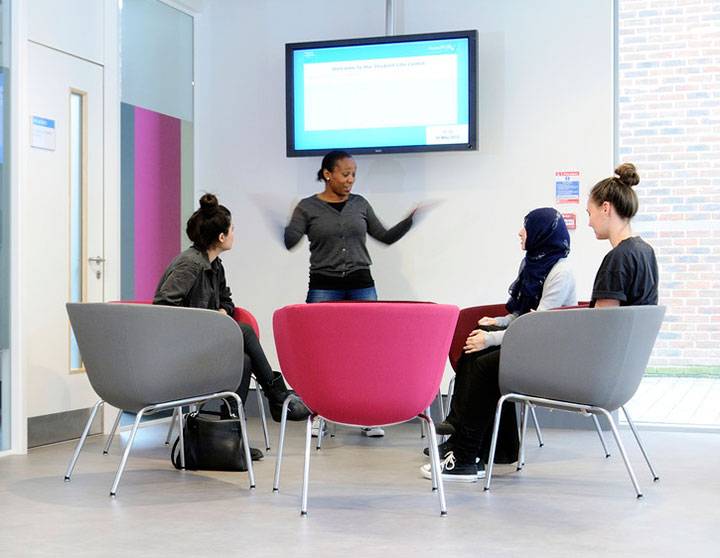Guidance for external Non-Medical Helper providers
Kingston University is keen to establish effective working relationships with external Non-Medical Helper (NMH) suppliers to ensure quality support provision for the benefit of our students.
Providers of Non-Medical Helper (NMH) support must adhere to the Disabled Students' Allowance Quality Assurance Group (DSA-QAG) Quality Assurance Framework (QAF) standards, and ensure that all relevant policies are in place, shared with the student, and made available to the University on request.
DSA-QAG requires external NMH suppliers to set up reporting mechanisms with Higher Education Institutions (HEIs) to inform them of the support being provided to students. They must explain to students the importance of the reporting mechanism, and encourage students to give permission for information to be shared. They must also familiarise themselves with the information provided by the HEI regarding the delivery of NMH services to their students, and cascade this information to support workers.
Our disability and mental health advisers are located in the University's Services for Students directorate. The advisers collaborate with a network of disability contacts in our faculties and other directorates to facilitate an accessible and inclusive learning environment for students with disabilities. More information about the roles and responsibilities of our disability and mental health advisers is available. Details about other support services for students at the University are also on our website.
Access for Support Workers
1:1 bookable confidential space
External providers are responsible for providing suitable meeting facilities that are comfortable, confidential and take account of the student's needs. Due to the limited availability of 1:1 bookable meeting rooms at the University, external providers would normally be expected to make independent arrangements external to the University.
Visiting and Parking
On rare occasions when support is being delivered on-site, we have provided information on parking near the University's four campuses and directions to the University's campuses. A map of Kingston town centre is available to download. The University also operates a free intersite bus service which runs between our Penrhyn Road, Kingston Hill and Roehampton Vale campuses.
Kingston University has four campuses at Penrhyn Road, Kingston Hill, Roehampton Vale and Knights Park. Further information on the respective University campuses and the courses delivered at those campuses is available.
The University's access guides are also a helpful first point for information on access around the campuses and accessible buildings.
Health and Safety
If meeting students on-site, support workers must report to the relevant reception area on the University campus to:
- sign-in and be issued with a visitor's pass;
- confirm their reason for visiting and who they are visiting and;
- request details of local fire and evacuation procedures.
External visitors are prohibited from entering unauthorised areas or areas that are not necessary or relevant to part of their work. If a fire alarm activates, support workers must leave the building as directed immediately. Similarly, any accidents or emergency situations must be reported to staff at the receptions immediately. Security cover University premises and the emergency contact number for the security control room is +44 20 8417 6666.
External NMH providers should also be mindful of University guidance on workplace/general safety.
Communication and Feedback
Information about support provision for disabled students should be sent to disability@kingston.ac.uk.
External suppliers must:
- inform the University if supplying support to our students;
- notify the University of the named person within the organisation (including contact details) with whom we can liaise about any student support queries, and respond promptly to queries or concerns that are raised about student support arrangements
- provide copies of any relevant policies on request
- ensure funding is in place before commencing sessions with a student, monitor the use of the allocated hours, and ensure that students do not run out of funding (Kingston University is not accountable for any payments that Student Finance England refuse to pay)
- arrange suitable meeting rooms for support sessions which will normally be off site due to the limited availability of suitable rooms on campus;
- signpost students back to their disability adviser or relevant faculty to discuss any issues relating to University services or their course
- contact the disability and mental health advisers via disability@kingston.ac.uk immediately if any concerns arise relating to engagement with the support, welfare, safety/security, or academic progression so that this can be followed up in a timely manner
- provide a summary report for each student receiving band 4 support at the end of each term (end of December, March, and June), to include the following information:
- name of student(s) and company registration number (CRN);
- name of support workers(s);
- brief description of support supplied;
- date on which support commenced;
- number of sessions/hours of support delivered that term, and total for the year to date;
- location of support provision;
- a note about any issues that the University needs to be aware of or follow up.
Contact us
Disability and mental health support
Tel: +44 (0)20 8417 7314
Fax: +44 (0)20 8417 7561
Email us
Website accessibility
We aim to make sure that all pages published on the Kingston University website are fully accessible for visitors with a disability.

What our students say
"The disability and mental health advisers sat down with me before university started to ensure that all necessary support was put in place, and made my lecturers aware of the adjustments I would need. It gave me confidence that I would be supported and achieve at university."
Contact us
Disability and mental health support
Tel: +44 (0)20 8417 7314
Fax: +44 (0)20 8417 7561
Email us